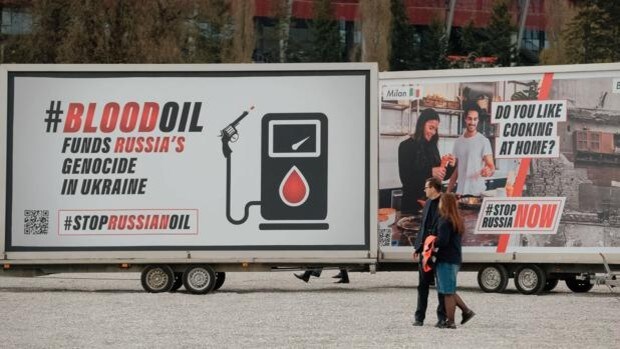The Pole is undoubtedly one of the European governments most aware of the need to curb Russian military policy and dissuade Putin from his strategy of territorial advances. The Polish media airs surveys carried out in Russia as the last of Active Group, based on telephone calls between March 11 and 14. According to this poll, 75.5% of Russians support Poland being the next country to be invaded, while 41% prefer the Baltic republics and 39% prefer the countries that belonged to the Warsaw Pact, such as Bulgaria, the Czech Republic, Slovakia, Hungary and Romania. Only 13.4% rejected attacking other countries to force them to stop supporting Ukraine and only 25.5% rejected the use of nuclear weapons.
But this feeling of imminent danger is not shared by the rest of the European partners and Prime Minister Mateusz Morawieckihas decided to bring them closer to this reality through an advertising campaign throughout the EU with which it intends to “raise the conscience of Europe” and dissuade the West from continuing to cooperate economically with Russia, as reported by the newspaper ‘Dziennik Gazeta Prawna’. Morawiecki launched the #StopRussiaNow campaign this past weekend, aimed primarily at Western European politicians, whom he accuses of wanting to return too quickly to good relations with the Kremlin. «Vladimir Putin has prepared a special operation that includes war crimes and genocide. What is happening on the streets of Ukraine shocked us, but only for a short time”, he laments, adding that he wants the campaign to become” a cry of those who have been brutally murdered in cities, towns and villages.
According to a poll, 75.5% of Russians support Poland being the next country to be invaded, while 41% prefer the Baltic republics and 39% prefer the countries that belonged to the Warsaw Pact, such as Bulgaria, the Czech Republic, Slovakia, Hungary and Romania
According to Morawiecki, the first advertising wagons are already heading to the largest cities in Western Europe, where they will soon be able to attract the attention of passers-by. Most of the banners, pictures of which the prime minister posted on his Twitter account, are based on the comparison between the standard of living of the middle and upper classes in Western Europe and the results of the Russian invasion of Ukraine. For example, one of the posters shows an image of a middle-aged man sitting on a hospital bed, clean and looking well cared for, and an image of a devastated hospital in Luhansk Oblast. “Are you satisfied with his medical care? #StopRussiaNow, says the announcement. Morawiecki also intends to visit several key European capitals to make other state leaders aware of increasing economic sanctions against Russia. “Germany, France, Austria, Italy: these countries have to do everything possible to stop the war in Ukraine by suspending the financing of Putin’s war machine,” he mentioned, after insisting that the sanctions already in force are “insufficient” . “Look at the ruble, look at the conditions of the Russian economy. The sanctions affect Moscow, but only in the long term, while Ukraine needs help here and now », he declared. after insisting that the sanctions already in force are “insufficient”. “Look at the ruble, look at the conditions of the Russian economy. The sanctions affect Moscow, but only in the long term, while Ukraine needs help here and now », he declared. after insisting that the sanctions already in force are “insufficient”. “Look at the ruble, look at the conditions of the Russian economy. The sanctions affect Moscow, but only in the long term, while Ukraine needs help here and now », he declared.
The Polish prime minister wants the campaign to become “a cry of those who have been brutally murdered in cities, towns and villages”
Since the beginning of the Russian invasion, Poland has donated 1.6 billion euros worth of anti-tank missiles, anti-aircraft missiles, ammunition and drones to Ukraine, Morawiecki calculated after meeting in Cravovia with his Ukrainian counterpart, Denys Chmygal. To this are added, according to the Polish media, about 60 armored vehicles. “This equipment is intended not only to preserve Ukraine’s sovereignty, but to preserve Polish and European sovereignty,” said Morawiecki after signing a cooperation agreement for the railway and freight transport sectors that allows kyiv to avoid blockade of Ukrainian ports. But none of these efforts will be effective if the rest of Europe continues to grease Russia’s war machine with money from energy purchases from Moscow. That is why Morawiecki is determined to raise awareness among the rest of the European partners. In the border region he is advancing in this direction at great speed. Bulgaria, where 90% of the gas comes from Russia, will be independent of that supply as soon as the price is set, according to the deputy chairman of the parliamentary committee for Energy, Ivaylo Mirchevon, who expects the gas interconnector with Greece to come on line after July to receive sufficient amounts of gas from Azerbaijan.
The Slovak Minister of Economy, Richard Sulík, has pointed out the American company Westinghouse, with a production plant in Sweden, in addition to two local uranium deposits, in the east of the country, as an alternative to Russian nuclear fuel. Finland, for its part, has restricted transmission capacity in cross-border connections with Russia since Sunday, so that import capacity will be a maximum of 900 MW instead of the previous 1,300 MW. The vice president of the European Commission, Věra Jourová, declared this past weekend on Czech television that she expects the sixth package of sanctions against Russia to be presented this week.

